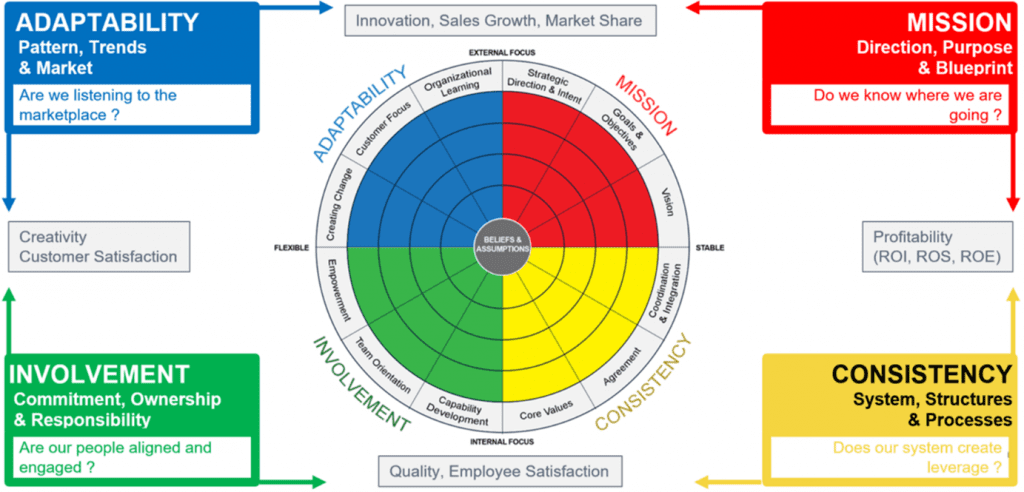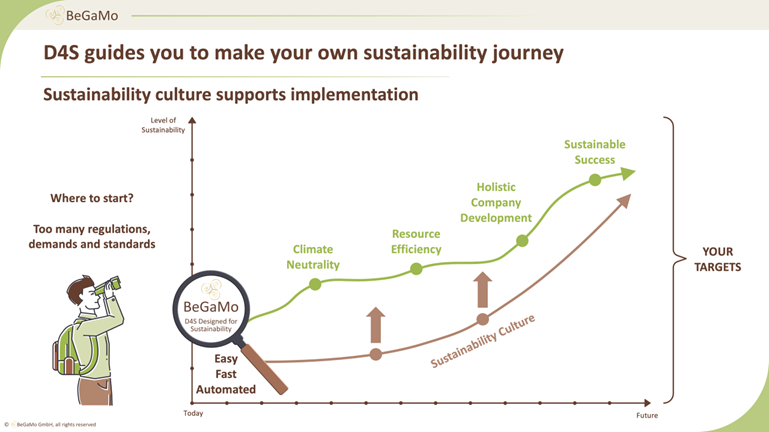Why Sustainability Significantly Impacts Your Strategy & Culture
Karen Jones & Michael Koch, May 2023
It’s all in the Purpose.
Many companies have in recent years made big improvements in their clear positioning on their purpose and strategy. This gives all stakeholders the joint identification to ‘why’ this company exists and what it stands for. To execute a successful implementation of a strategy, it is also essential to have a strong and joint commitment to a high-performance culture. A company’s culture encompasses its values, beliefs, and practices, that guide its decisions and actions. Or in other words, it defines which behaviors are tolerated and which behaviors are NOT. Many great strategies still do not deliver to promise, when their cultural element is underappreciated in the strategic implementation process. When this happens the potential in the company is also lost, failing to show in the performance results.
How do we make culture tangible enough to be managed and well lead?
Denison Consulting have tools and methodology that enable leaders to translate seemingly complex situations into an easy-to-understand approach, helping leaders identify the factors that most impact – or hinder – their success as an organisation.

On top of those challenges and ‘normal’ business, our society is faced with another dimension – how can we address the elements of Sustainability and make our society ‘future’ proof.
For leaders, this means transforming their business for sustainable & long-term success. This agenda needs to be integrated into the business strategy, with accountable sustainability metrics. New and diverse skills are required to support this work and mandate. Given the significant cultural and operational transformation involved in embedding sustainability, leaders need to be interacting with the rest of the business – more coordination and integration will be required.
How does Sustainability & Organisational Culture align?
Sustainability has become an increasingly important issue for companies as society becomes more aware of the environmental and social impacts of business activities. Business leaders play an essential role in the transformation of this societal problem into their own company.
“But what is the nature of this mandate today? How are sustainability leaders and their teams interacting and connecting with the rest of their organization? Do they have access to the necessary resources, and the license to influence mindsets and culture?”¹
To address this issue, companies have started to adopt sustainable practices, such as reducing their carbon footprint (towards carbon zero), resource efficiency, using renewable energy, and promoting social responsibility. Still, there is a big GAP in the full understanding of future needs across many companies.
“We are living in the “decade of delivery”; a time when sustainability has become not only a core strategic consideration and direction for businesses, but a driver of innovation and attractor of talent.”²
Newly developed services, like the D4S Designed for Sustainability from BeGaMo (see graph), are now available to help companies to get an easy, quick & full ‘360° status’ on all relevant sustainability elements. This 360-degree review supports them in their roadmap toward their own sustainability strategy and towards the upcoming requirement of non-financial reporting (eg. CSRD, ESG ³).

These required changes cannot be achieved through policies and regulations alone, but through a cultural shift that drives sustainable practices.
Companies that prioritize sustainability in their culture are more likely to succeed in the long term. They tend to have a better reputation, attract, and retain employees who share their values, and build stronger relationships with their customers and stakeholders. Additionally, a sustainable culture can lead to cost savings by reducing waste, improving efficiency, and increasing productivity.
To help companies think through and measure these cultural changes, Denison has created in partnership with Stu Hart the Transformational Sustainability “House”. The “House” defines the culture of sustainability with five key pillars: Purpose, Values, Aspirations & Questions, Goals & Metrics, and Rewards & Incentives.
Denison’s Sustainability module can be used in unison with their cultural diagnostic to determine a company’s top cultural drivers of sustainability – helping them to prioritise the required behaviours to drive their sustainability agenda.
Overcoming the Contextual Obstacles for a Sustainable Culture
It must be recognised that the transformation towards a sustainable company and achieving carbon-zero targets is not without its challenges. Companies must navigate potential pitfalls such as insufficient investment, resistance to change, lack of collaboration, greenwashing, and regulatory challenges. However, by setting clear goals, investing in sustainability, engaging with stakeholders, collaborating effectively, avoiding greenwashing, advocating for supportive policies, and in parallel the adaptation of their culture – companies can overcome these challenges and make progress toward a successful & more sustainable future.
If a company’s strategy emphasizes sustainability, it can reinforce its culture of sustainability by investing e.g., in renewable energy, reducing waste, and promoting social responsibility. Such demonstrations of commitment can help to build trust with stakeholders and attract employees who share the company’s values.
Our environment requires answers to fast and fundamental external changes and challenges. Therefore companies must ensure that their culture and strategy are adapted, aligned, and effectively communicated to achieve their long-term goals and satisfy their different stakeholders.
Do not hesitate to reach out to the undersigned for further questions, discussion, and/or clarification.
Michael Koch – michael.koch2010@yahoo.de / LinkedIn
Karen Jones – kjones@denisoncultureeurope.com / LinkedIn
Footnotes:
¹ License to Transform: A Guide for CEOs on the State of Sustainability Leadership
DECEMBER 2022.Spencer Stuart
² License to Transform: A Guide for CEOs on the State of Sustainability Leadership
DECEMBER 2022. Spencer Stuart
³ CSRD Corporate Sustainability Reporting Directive (European), ESG (Environmental, Social, Governance)




